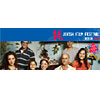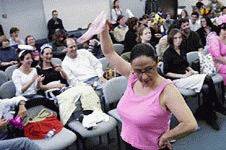AVIVA-Berlin >
Interviews
AVIVA-BERLIN.de im Februar 2026 -
Beitrag vom 03.06.2008

Immigration auf HebrûÊisch. Interview mit der Protagonistin Yoalla Saar
Katharina HûÑftmann
In dem Doku-Film "A Hebrew Lesson" beobachten wir in Israel Gestrandete aller Nationen bei ihren ersten schweren Gehversuchen. Sie sind dabei vor allem symbolisch fû¥r Immigration auf der ganzen Welt
Yoalla Saar steht am Kopf des Klassenzimmers wie ein Baum. Ihre HûÊnde fuchteln um ihr Gesicht, wûÊhrend sie ihren NeuankûÑmmlingen zwei Worte vorbetet: "Ani Yoalla." Streng schaut sie um sich, in unsichere Augenpaare und fragende Gesichter. "We mi ata?" Nach einiger Begriffsstutzigkeit bei allen Beteiligten, plûÊtschert es langsam los: "Ani Annabell." "Ani Chin." "Ani Sascha." "Ani Marisol." "Ani Dong Dong".
Deutsche, Chinesin, Russe, Peruanerin und wiederum Chinesin. So liest sich das who is who des obligatorischen AnfûÊngerkurses fû¥r HebrûÊisch: Ulpan. Und gleichzeitig die Liste der im Film vorgestellten Einwanderer. Wenn man in Israel leben und û¥berleben mûÑchte, ist die Sprache (wie in den meisten LûÊndern) essentiell. Umso mehr, als dass die oder der totale AnfûÊngerIn dort im Supermarkt nicht einmal lesen kann, was sie/er kauft.
Diese Umgebung haben sich die FilmemacherInnen David Ofek, Ron Rotem und Elinor Kowarski ausgesucht, um û¥ber Immigration im Einwandererland Israel im Kleinen und die Gesellschaft des jû¥dischen Staates im Groûen zu erzûÊhlen.
Dafû¥r werden die Wege einzelner KursteilnehmerInnen liebevoll nachgezeichnet. So ist da die Chinesin Chin, die als Putzfrau im First-class-Viertel von Tel Aviv anfing und schlieûlich den Herrn des Hauses heiratete ã mit ihm allerdings ohne ihre Tochter lebt, die sie in China zurû¥cklassen musste. Der russische Jude Sascha, der ins Land gekommen ist, um fû¥r das Sorgerecht fû¥r seine in Israel lebende Tochter zu kûÊmpfen.
Wir folgen dem Weg der deutschen Annabell, die wegen ihres israelischen Freunds nach Israel gezogen ist. Wir leiden mit der peruanischen "jû¥dischen Prinzessin" Marisol, die sich mit einem herzlosen israelischen Liebhaber herumschlûÊgt, von dem sie schwanger ist. Und dank der sensiblen Chinesin Dong Dong lernen wir auch noch eine Menge û¥ber das Leben illegaler chinesischer ArbeiterInnen in Israel kennen.
Sie alle sind mehr oder weniger gezwungen in Israel angekommen und treffen nun auf die vor Energie û¥berschûÊumende Ulpan-Lehrerin Yoalla. Die Geschichten, die sich um die Gemeinschaft herumranken, sind vor allem emotional und berû¥hrend. Wer jemals fû¥r lûÊngere Zeit in einem fremden Land war, wird sich in vielen Momenten in der Verlorenheit und Verwirrtheit der Protagonistinnen wieder finden. Doch es beruhigt, dass sie nicht ganz allein sind: Das Herz des Filmes ã Yoalla ã bemû¥ht sich nach KrûÊften, ihnen allen ein wenig das Gefû¥hl von einer Heimat im Klassenraum zu geben.
AVIVA-Berlin sprach nach der Filmvorfû¥hrung beim 14. Jewish Filmfestival mit der passionierten Lehrerin und zentralen Filmfigur Yoalla Saar û¥ber Fremde in der Fremde. Sie selbst war als Weisenkind nach Israel gekommen und kennt das Gefû¥hl, das alle ImmigrantInnen auf der Welt verbindet.
AVIVA-Berlin: Shalom Yoalla, first of all I want to thank you for taking the time for the interview. And I want to tell you, that the movie was really wonderful.
Yoalla Saar: Yes. You liked it? I am happy. It is touching, right? Very emotional.
AVIVA-Berlin: Oh, absolutely. So in the movie we learn a lot about you, also some very personal things ã was it hard for you to make the movie?
Yoalla Saar: No, not at all. I am always like this in class. This is how I work. I didnôÇt feel the camera. And I always tell personal things to my students ã how couldnôÇt I? I ask them so many personal things about their lives. Like: are they married, do they have a boyfriend? So if they ask me: How old are you? I would say no? No, I canôÇt ask them to tell me and I donôÇt tell them anything.
AVIVA-Berlin: Israel is one of the countries with most immigration. You are together with lots of immigrants when they take their first steps. How well does the immigration work?
Yoalla Saar: OhãÎ In the beginning there are a lot of problems, several problems for everyone. A lot of them donôÇt come because they want to. They are no Zionists or something. So they are "forced" in a way, because they have an Israeli boyfriend or husband.
AVIVA-Berlin: What do you think is the biggest problem for all of them? Getting all the permits for example?
Yoalla Saar: I donôÇt want to answer too quickly and just say "the language". But on the other hand: this is a major problem. I feel it right now in Germany. I feel like I donôÇt belong here. I donôÇt know the language, I donôÇt understand anything. But for them living in Israel it is not only that. They know no Hebrew and in addition some of them are not even Jewish. So when we talk about religion in class, they canôÇt add anything. So they are disconnected in a way. And they have many problems more. For example, some of them come for Israeli boyfriends, but then when it gets serious and they talk about marriage, the Israeli men back off. Look, in the movie only two girls of this class actually stayed in Israel. All the rest went back to their home countries. That shows you how hard it is.
 AVIVA-Berlin: We saw in the movie that it was really tough for the Chinese girls to get along with the Israeli way of life. Do you think that itôÇs more difficult to assimilate for certain ethnic groups?
AVIVA-Berlin: We saw in the movie that it was really tough for the Chinese girls to get along with the Israeli way of life. Do you think that itôÇs more difficult to assimilate for certain ethnic groups?
Yoalla Saar: Oh yes. Sure it is, especially for the Chinese and Japanese people. They think I am rude when I tell them to be quiet - already then! So it is harder for them. But for the people from other Nations? I donôÇt think so. The Americans for example are even ruder than me.
AVIVA-Berlin: I made an Ulpan myself. And my teacher was also energetic like you. Is this a necessary qualification in order to be an Ulpan teacher?
Yoalla Saar: Unfortunately not a lot of Ulpan teacher are that energetic. Lots of them are sitting, giving exercises and resting ã I donôÇt! I work from 8 to 1. Even in the breaks! Have you seen me in the movie? I talk to them in the breaks about their troubles.
AVIVA-Berlin: So you are a therapist and teacher in one person?
Yoalla Saar: Yes, in a way. But I canôÇt let them fall. I hold them and I want to carry them. They are in my mind all the time. I even dream of them. I am a full-time teacher. But you know it is because their life is in my hands.
AVIVA-Berlin: DoesnôÇt this get too heavy on your shoulders sometimes?
Yoalla Saar: No. It is not too much! Look. You are a teacher or not ã there is not a bit. It is like being a mother. You canôÇt just leave and say it is too much. You are a mother or not as well as you are a teacher or not. IôÇll go with them until the end!
AVIVA-Berlin: Which part about studying Hebrew is the hardest?
Yoalla Saar: Oh. ThatôÇs a very good question. First of all I would say it depends on your original language. For example if you know Arabic it is a lot easier, because both are Semitic languages. And Russian for example has a similar syntax like Hebrew.
AVIVA-Berlin: LetôÇs say, the original language is German.
Yoalla Saar: Well I want to give a global answer. First of all the letters are difficult - but than, you study that fast, so this answer is too simple. Second, it is very difficult, that the feminine and masculine form has to be in every word, no matter if it is a number or an adjective or a verb. No other language goes that far. But what is really difficult, is to get the spirit of Hebrew. Look, for example, there is no verb like "have" in Hebrew, because in the Judaism nothing belongs to us. So the way we say "I have" sounds more like we got it accidentally. That is something very deep. And this is really difficult to understand.
AVIVA-Berlin: Thank you very much! Weitere Infos zum 14. Jewish Film Festival auf AVIVA-Berlin.